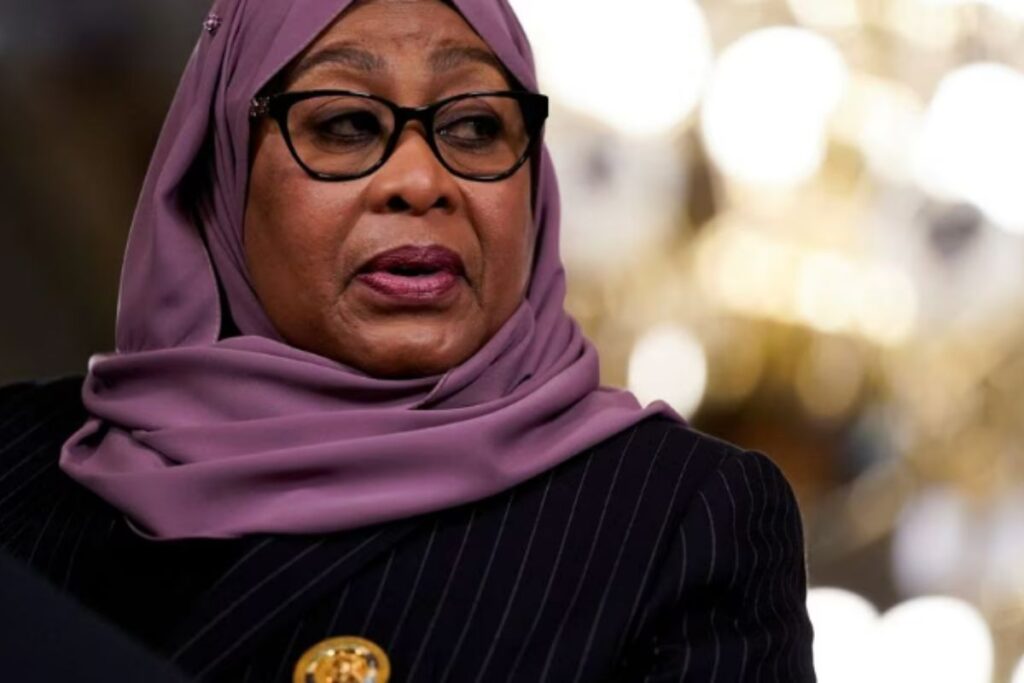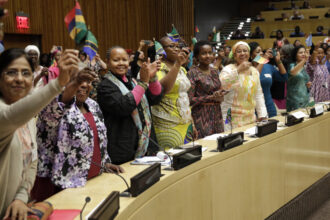Discussions between Germany and Tanzania will commence regarding the historical impact of Germany’s colonial presence in Tanzania, announced by the leaders of both nations on a recent Tuesday.
Tanzanian leaders and advocates have been vocal in their demands for compensations and the repatriation of human relics that are currently housed in German cultural institutions.
In a joint media briefing with German President Frank-Walter Steinmeier, Tanzanian President Samia Suluhu Hassan stated, “The matters of the colonial aftermath with Germany have been thoroughly deliberated, and we stand at the brink of initiating formal talks to address these issues.” President Hassan further acknowledged the anticipation of Tanzanian families awaiting the return of ancestors’ remains from German museum collections. She emphasized the importance of carefully structured negotiations.

It is believed these human remains were collected by historical researchers for discredited racial studies.
During his visit to Tanzania, President Steinmeier conveyed his intention to engage with individuals impacted by the historic Maji Maji uprising, which was a resistance movement against German colonial rule between 1905 and 1907. He highlighted the need for mutual agreement on conducting deeper inquiries into the colonial era, with the aim of fostering a renewed understanding and moving forward.
Germany’s colonial domain over mainland Tanzania, formerly referred to as Tanganyika, spanned from the 1880s until the British takeover in 1918 amidst the First World War.
The Maji Maji insurrection saw catastrophic casualties, primarily due to starvation as German military efforts deliberately disrupted the insurgents’ food supplies. In 2021, Germany extended an official apology for the mass killing of approximately 75,000 indigenous people in what is now Namibia, recognizing it as genocide and committed to finance projects surpassing one billion euros.
Concurrently, Britain’s King Charles is on a visit to Kenya, a neighboring country of Tanzania, where he is encountering demands from local advocates to issue apologies and consider reparations for the maltreatment during British colonial governance.
Background Reasons for Germany-Tanzania Talks
In the landscape of international relations and diplomacy, historical reckonings often emerge long after the dust has settled on the events in question. The recent announcement by Germany and Tanzania to engage in dialogue over the consequences of Germany’s colonial past in Tanzania is a testament to this enduring need for reconciliation and understanding.
Colonial History and Its Long Shadow
The roots of these talks go back to the era when European powers scrambled for control over Africa, resulting in the division and colonization of the continent. Germany established its rule over Tanzania, then known as Tanganyika, and exerted its power through the late 19th and early 20th centuries. This period is marred by episodes of brutal repression, the most infamous being the Maji Maji Rebellion, where tens of thousands of Tanzanians perished.
A Shift in Global Consciousness
The move by Germany to open discussions with Tanzania reflects a broader trend in which former colonial powers are increasingly being called to account for their past transgressions. This shift is part of a global consciousness that acknowledges the deep scars left by colonialism, which continue to affect the socio-economic and political realities of former colonies.

The Push for Reparations
Tanzanian demands for reparations and the return of human remains are grounded in the pursuit of justice and dignity for the descendants of those who suffered under colonial rule. Human remains in German museums, often taken under exploitative and unethical circumstances, are a painful reminder of the disregard for African lives and cultures.
Germany’s Apology and Precedent
Germany’s previous apology and recognition of genocide against the Herero and Nama peoples in present-day Namibia have set a precedent. The acknowledgment and the commitment to fund projects were seen as a step towards restorative justice, increasing pressure on Germany to extend similar considerations to Tanzania.
The Global Implication of Such Talks
As these talks unfold, they not only represent a bilateral effort to resolve historical issues but also signal to the international community the importance of confronting colonial legacies. The outcomes could influence other former colonial powers to engage in similar dialogues.
The Importance of Research and Understanding
President Steinmeier’s emphasis on research aligns with the view that a thorough and honest examination of history is crucial. Uncovering and disseminating the full account of what occurred during the colonial period is necessary not only for reconciliation but also for educating future generations.
The impending talks between Germany and Tanzania are more than diplomatic gestures; they are part of a critical process of reevaluating history, acknowledging wrongdoing, and seeking to mend the lingering wounds of colonialism. It’s a complex and sensitive journey that requires courage, commitment, and a willingness to address uncomfortable truths for the sake of a more just and informed world.
Join Our Compassionate Crusade: Your Donation Is a Lifeline in Our Global Crisis Response
Your contribution, large or small, fuels the efforts to solve these global crises, providing direct aid to those in urgent need and supporting the long-term initiatives that address the root causes of these challenges. Be the difference you wish to see; join us in this mission by donating now. Together, let’s transform the tide of adversity into an ocean of opportunity for generations to come.





















